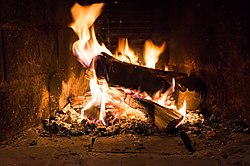Embed Code
When a flame is applied to cannabis flower or hash, whether in a bowl, joint, or other rolled product, combustion occurs. Cannabis is decarboxylated after combustion, making cannabinoids, terpenes, and other plant chemicals available for absorption by the body.
Combustion, or burning, is a high-temperature exothermic redox chemical reaction between a fuel (the reductant) and an oxidant, usually atmospheric oxygen, that produces oxidized, often gaseous products, in a mixture termed as smoke. Combustion does not always result in fire, because a flame is only visible when substances undergoing combustion vaporize, but when it does, a flame is a characteristic indicator of the reaction. While activation energy must be supplied to initiate combustion (e.g., using a lit match to light a fire), the heat from a flame may provide enough energy to make the reaction self-sustaining. The study of combustion is known as combustion science.


Combustion is often a complicated sequence of elementary radical reactions. Solid fuels, such as wood and coal, first undergo endothermic pyrolysis to produce gaseous fuels whose combustion then supplies the heat required to produce more of them. Combustion is often hot enough that incandescent light in the form of either glowing or a flame is produced. A simple example can be seen in the combustion of hydrogen and oxygen into water vapor, a reaction which is commonly used to fuel rocket engines. This reaction releases 242 kJ/mol of heat and reduces the enthalpy accordingly (at constant temperature and pressure):
Uncatalyzed combustion in air requires relatively high temperatures. Complete combustion is stoichiometric concerning the fuel, where there is no remaining fuel, and ideally, no residual oxidant. Thermodynamically, the chemical equilibrium of combustion in air is overwhelmingly on the side of the products. However, complete combustion is almost impossible to achieve, since the chemical equilibrium is not necessarily reached, or may contain unburnt products such as carbon monoxide, hydrogen and even carbon (soot or ash). Thus, the produced smoke is usually toxic and contains unburned or partially oxidized products. Any combustion at high temperatures in atmospheric air, which is 78 percent nitrogen, will also create small amounts of several nitrogen oxides, commonly referred to as NOx, since the combustion of nitrogen is thermodynamically favored at high, but not low temperatures. Since burning is rarely clean, fuel gas cleaning or catalytic converters may be required by law.
Fires occur naturally, ignited by lightning strikes or by volcanic products. Combustion (fire) was the first controlled chemical reaction discovered by humans, in the form of campfires and bonfires, and continues to be the main method to produce energy for humanity. Usually, the fuel is carbon, hydrocarbons, or more complicated mixtures such as wood that contain partially oxidized hydrocarbons. The thermal energy produced from the combustion of either fossil fuels such as coal or oil, or from renewable fuels such as firewood, is harvested for diverse uses such as cooking, production of electricity or industrial or domestic heating. Combustion is also currently the only reaction used to power rockets. Combustion is also used to destroy (incinerate) waste, both nonhazardous and hazardous.
Oxidants for combustion have high oxidation potential and include atmospheric or pure oxygen, chlorine, fluorine, chlorine trifluoride, nitrous oxide and nitric acid. For instance, hydrogen burns in chlorine to form hydrogen chloride with the liberation of heat and light characteristic of combustion. Although usually not catalyzed, combustion can be catalyzed by platinum or vanadium, as in the contact process.
English
Etymology
From Old French combustion, from Latin combustio, from comburere (“to burn”), itself from the intensifying prefix com- + the root burere (a faulty sep. of amburere "to burn around", itself from ambi- + urere "to burn, singe"); equivalent to combust + -ion.
Pronunciation
- IPA(key): /kəmˈbʌs.t͡ʃən/
Noun
combustion (countable and uncountable, plural combustions)
- (chemistry) The act or process of burning.
- A process whereby two chemicals are combined to produce heat.
- A process wherein a fuel is combined with oxygen, usually


![{\displaystyle {2\,\mathrm {H} {\vphantom {A}}_{\smash[{t}]{2}}(\mathrm {g} ){\text{+}}\mathrm {O} {\vphantom {A}}_{\smash[{t}]{2}}(\mathrm {g} )\rightarrow 2\,\mathrm {H} {\vphantom {A}}_{\smash[{t}]{2}}\mathrm {O} \uparrow }}](https://wikimedia.org/api/rest_v1/media/math/render/svg/2c61b3cfd78e4a45782c53675acc553ced21c7f3)



